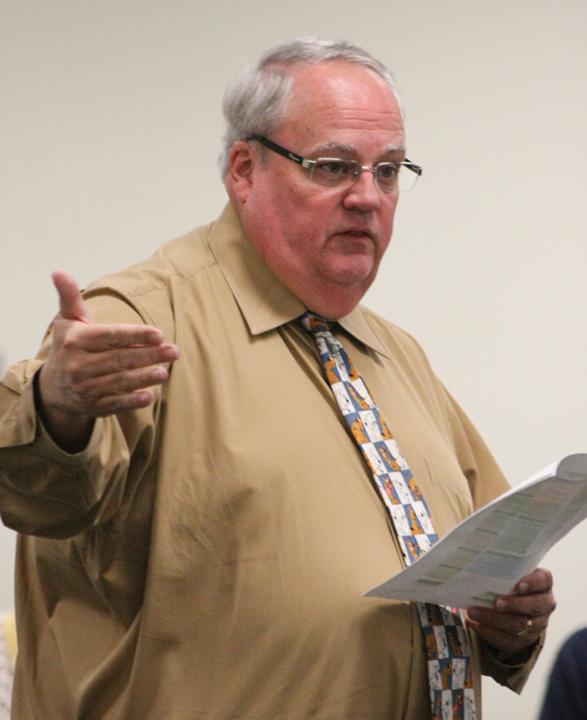Schedule changes coming after Faculty Senate meeting
Glenn Coltharp, Dean of the School of Education, discusses upcoming plans during a Faculty Senate meeting on Monday. The Senate adopted plans to change summer class schedules for 2012 and more.
At this week’s Faculty Senate meeting Dr. Glenn Coltharp, Dean of the School of Education, presented a plan for changes to the 2012-2013 academic calendar. The summer schedule had a greater number of changes than the regular school year.
“The proposal as it stands now is that we would take what is a current eight week schedule and break it up into a variety of options that the department would have available to them,” Coltharp said. “As we talked in the past about two four week sessions … I know with science for example, going into two four weeks was something that was of great concern of being able to get the course objectives mastered in that time, so we tried to look at other options.
“There would be a week after graduation, and then a six week session would start and run basically until the end of June. There would be another six week session that would start in July and run until the week before school starts, so students would have a chance for a break in between. There will also be a four week session. The options will be open for each department to choose which classes they will use for each of the slots.”
The Faculty Senate gave Coltharp several points of feedback, focusing on intersession concerns.
“That would impact them if they were wanting a six week session,” he said.
“If it’s a four week or eight week, there would still be that two week time frame and the intersession. I think part of the idea with the six week was more for science classes. There are certain classes, even for nursing, that needed the two sessions together with it.”
Kinesology has already shown concern about the possibility of cutting intersession courses. Colthorp said the concerns will be brought to the President’s council on Monday. Faculty Senate also said they would like to see the changes applied to online courses as well.
The plan was to even up the semesters to reduce problems teachers had with course planning.
“The major change we’re recommending with that is to reduce a week with it,” he said. “If you’ve ever made that transition either on blackboard or class schedule … we’ve always had a week longer with the spring semester. It’s my guess that it was done due to weather possibilities. The committee thought that now the majority of the classes have communication through Blackboard.”
This would also remove reading day.
Vice President AJ Anglin reported to the Faculty Senate in place of University President Bruce Speck due to illness. Anglin said there has been progress in the performance based funding.
“It is not finalized, but what I think is going to happen in the next month or so…there are four majors most likely that will be asked to be measured at all universities,” he said. “There are three categories…one is student progress which will include typical things like freshman to sophomore retention rate, the number of full time degree seeking students that have completed 24 credit hours in their first year. There’s also degree attainment which is the six year graduation rate and total of degrees …and then there’s the quality of learning.”
Anglin said the University is in the process of deciding the chosen criteria and must report back to the governing body by Nov. 15 with its decision.
Anglin also said the search for the dean of the school of business is underway and discussed the tenure meeting and shared governance survey in brief, then finished by reading a statement he had written about the previous Faculty Senate meeting.
“In my 40 plus years of work in higher education at seven institutions I have never seen faculty colleagues treat other faculty colleagues so disrespectfully,” he said. “Undoubtedly it was my most regrettable shared governance experience.”
Anglin’s full statement can be found at thechartonline.com.
He also read a statement from dean Richard Miller who shared similar sentiment, calling the meeting an “ambush.” The Faculty Senate and its executive committee did not respond to either statement during the meeting.
The committee on committees made a movement to disband the honor’s convocation committee on the grounds that the convocation has been unattended by audience and participants alike.
“We suggested to the President’s council that the outstanding graduate and Spencer Bartlett awards could be presented at graduation, while individual department awards could be presented in each department or dropped as each department sees fit.”
Whether or not this year’s convocation is still happening is up in the air.
For over an hour there was discussion of changes to academic policy. Faculty Senate made a motion to approve all changes in mass, barring any proposals the Faculty Senate wished to discuss. The motion was approved after removing three items for discussion.
Your donation will support the student journalists of Missouri Southern State University. Your contribution will allow us to purchase equipment and cover our annual website hosting costs.




























